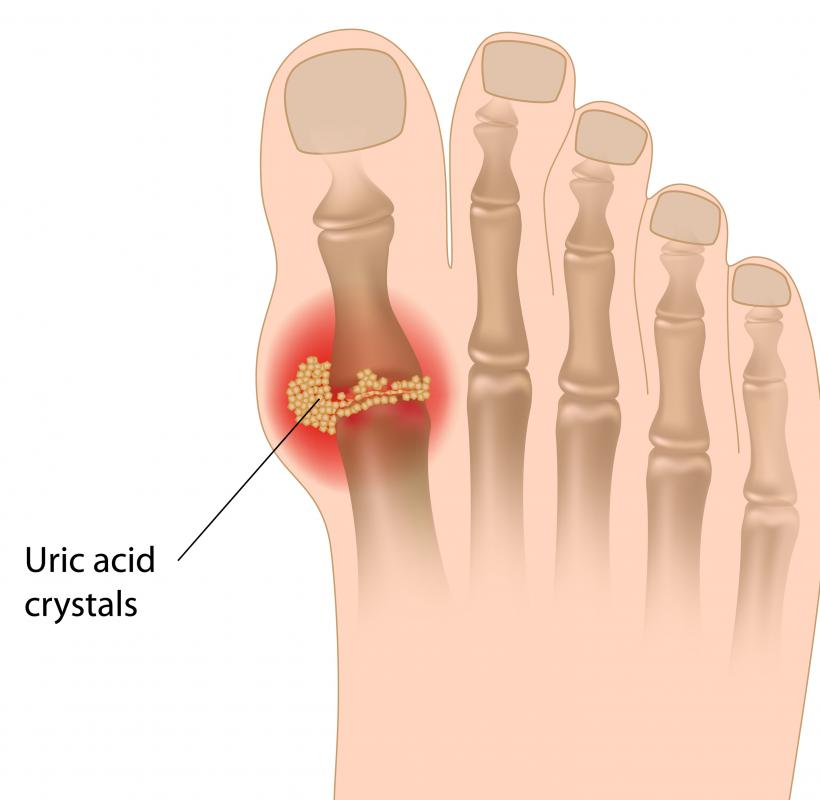At WiseGEEK, we're committed to delivering accurate, trustworthy information. Our expert-authored content is rigorously fact-checked and sourced from credible authorities. Discover how we uphold the highest standards in providing you with reliable knowledge.
What is Allopurinol Gout Treatment?
Allopurinol is a common treatment for gout used to block excess production of uric acid and help the body excrete acid that might cause problems. It is a xanthine oxidase inhibitor, which means taken regularly, allopurinol can prevent recurrence of gout attacks. Allopurinol gout treatment helps break down purines in uric acid that can form crystals around joints. The crystals can settle in the soft tissue surrounding the joint, provoking irritation that leads to swelling and pain.
About one-fifth of purines come from food. The rest is made in the body and excreted in the urine or feces. When production of uric acid increases or does not leave the body, allopurinol gout treatment can help.

Most patients begin with 100 mg a day, with the dosage increased until uric acid drops to acceptable levels. The medicine can be adjusted up to a maximum 800 mg a day. Once allopurinol treatment begins, it should continue every day to prevent further gout attacks, and it might take six month to a year before episodes cease.
Doctors do not recommend starting allopurinol gout treatment during a flare-up. Allopurinol causes crystals around the joints to dissolve, which can trigger gout because uric acid levels are changing. The longer a person has suffered from gout, the longer it takes before allopurinol gout remedies work. Pain and swelling commonly occur in the big toe, but other joints can be affected. Sometimes two or more joints can swell during bouts, which usually go away within a week.

Excessive alcohol use is one of the major contributing factors of gout, especially when allopurinol is used. Alcohol is a diuretic, causing frequent urination; it can quickly deplete the body of the drug. Sugared soft drinks also tend to raise uric acid levels, along with some organ meats, seafood, yeast, bacon, and turkey. Vitamin C has been shown to help decrease gout spells in some people. Weight loss also helps in some cases.
Allopurinol gout medication is commonly started in middle age, when gout typically surfaces. More men than women suffer from gout, and there tends to be a family history of the condition. Attacks can occur once or return within weeks, months, or even years after the initial occurrence. Some gout patients find that elevating the joint and applying ice packs help with pain and swelling. Anti-inflammatory drugs are commonly prescribed for chronic gout.
Common side effects of allopurinol gout therapy include a gout attack while taking the medication. The attack is evidence that crystals are dissolving in preparation for leaving the body. Other side effects include headache, hair loss, stomach pain, or nausea. Some people as they age become ultra-sensitive to the drug, a serious side effect of allopurinol.
AS FEATURED ON:
AS FEATURED ON:












Discussion Comments
@donasmrs-- It's true that allopurinol triggers gout flare-ups in the beginning. But they can be kept under control with an additional gout medication until these initial flare-ups disappear.
@turquoise-- You can't take allopurinol during a flare-up. I don't know how long you have to wait, but I think you can take the medication once your gout symptoms are gone.
Allopurinol is not going to work if you take it on whim whenever you want. You have to take it regularly for it to be effective because allupurinol gets rid of uric acid crystals and prevents the production of uric acid over time. It's not going to work immediately, but it will provide long-term relief.
Also, don't be surprised if you have gout attacks as an allopurinol side effect during your treatment. As the medication works to get rid of crystals, gout attacks are common in the beginning. Slowly the flare-ups will go away completely. So some patience is necessary.
I had my first gout flare-up six months ago. It went away on its own at the time and I did not have another flare-up until two days ago. During my first flare-up, my doctor gave me allopurinol for my gout but I didn't take it regularly because of the side effects.
I can't take allopurinol now can I? How long do I need to wait after a flare-up to take it?
Post your comments